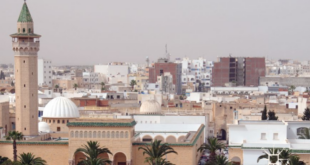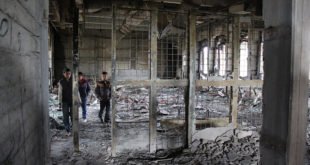Schleifer: How would you describe the particular challenge (as the leading global TV news agency) of providing coverage of this Gulf War?
Ritchie: With this one you need to be live or very close to live. The broadcasters expect to see pictures immediately and our biggest investment before the conflict was in insuring live coverage. That meant setting up forty operational cameras in the region-in Iraq and the immediate neighboring countries. And many of the cameras on the road have a "store and forward" facility-the images are transferred from camera to laptop which is in turn connected into a satellite telephone or they have relatively easy access to a Satellite News Gathering facility (SNG) and therefore many of them can report live. For example, we were the first with live pictures out of Umm Qasr in the beginning of the war and in the past few days we were the first with live pictures from Baghdad airport.
And in addition to the satellite phones with store and phone capability, which are everywhere, we also have SNGs in Qatar, Kuwait, Jordan and in Baghdad. The fifth unit is a mobile SNG covering southern Iraq. In Qatar our SNG provides live facilities for other broadcasters, such clients as NHK, ITN, Fox, and many other clients.
We have four embedded cameramen with the American and British armies and we are embedded on board ships such as the USS Constellation. The Constellation is a good example of the coverage we are providing. We had live pictures from the constellation of the launch of missiles in the earliest strikes against Baghdad.
Schleifer: Have any AP people been wounded or captured?
Ritchie: I am relieved to say that so far the answer is no but as you know the situation right now is very dangerous. This morning we had pictures from Saddam's Palace that was taken over by US forces in Baghdad, raiding deep into the city.
Schleifer: In a crisis situation like this what happens to your strong card for Arab broadcaster clients, which is the MECC (Middle East Custom Coverage). [Editor's note: APTN provides cameramen and crew to help both the strictly satellite broadcasters as well as the older terrestrial broadcasters introduce stories developed by the APTN- supplied crews.]
Ritchie: That is continuing even from Baghdad - we have five or six reporters working with us (not exclusively). How many? Well, I cannot think of a single Middle East broadcaster that isn't an MECC client.
The key issue in this conflict has been planning-we started planning four or five months ago-and also the fact that we have had a dedicated bureau in Baghdad for nearly ten years. With a long time presence there we have been able to cover all aspects of the conflict fairly and objectively.
In northern Iraq, we have several crews with store and store-satellite phones. Store and forward is an enhancing device in which we connect the camera to a laptop with high compression software, and it enhances the picture. Our system is called "Live Wire." [Editor's note: this technology is further discussed by David Cass in this section. See New Compressions Technologies Aid War Reporting, Save Cash]
In response to the issue of the importance of "live," we have introduced a new service called "APTN Direct" which offers two additional channels of live coverage from the conflict zone. Normally we put out a single feed to global customers of our global coverage, which includes important items of other coverage, elsewhere in the world. So our clients who all receive that now have the option of also receiving two additional feeds of exclusive Gulf War III footage which is 24/7 exclusive Gulf War and almost entirely live coverage from all our various positions, which we move to and from depending on the drama and importance of the story.
And this new feature along with our basic coverage is very much appreciated by our clients, among them the major APTN Direct customers such as BBC, Fox, ABC, NHK, Sky, Al Jazeera, Abu Dhabi, Al Arabiya, and Khalifa. We think this is an innovation that recognizes the live nature of this conflict and therefore it has been very much appreciated.
 Arab Media & Society The Arab Media Hub
Arab Media & Society The Arab Media Hub




